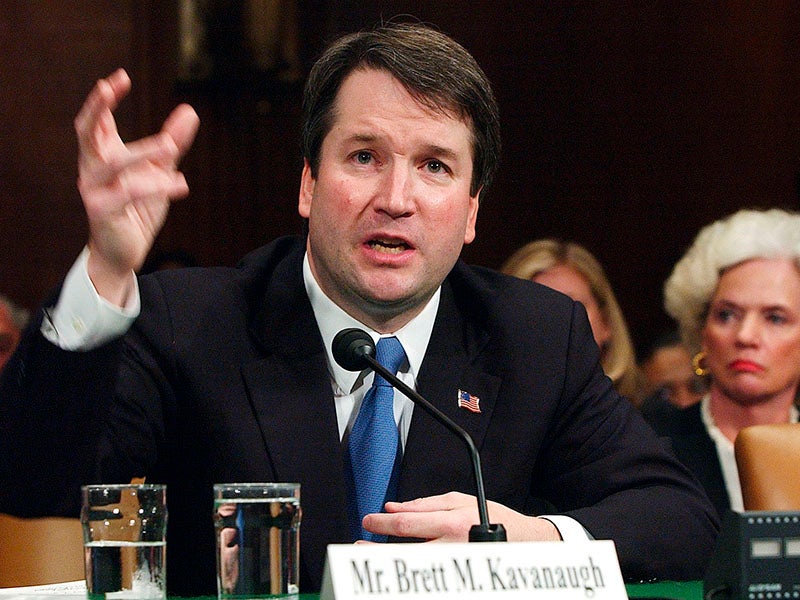Judge Kavanaugh Hides from Record of Pro-Polluter, Anti-Environment Rulings in Confirmation Hearings
Supreme Court nominee falsely contends “in many cases I’ve ruled for environmental interests,” while his record shows he’s ruled against clean air and clean water 89% of the time
Contact
During his nomination hearing for a seat on the nation’s highest court, Judge Brett Kavanaugh asserted that “in many cases I’ve ruled for environmental interests … (citing just 6 out of 26 case opinions involving EPA) … and so, there are a large number of cases where I’ve ruled in favor of environmentalist interests.” Judge Kavanaugh appeared to be repeating talking points from an earlier Heritage Foundation analysis of his record published last week.
The following is a statement from Patrice Simms, Vice President of Litigation at Earthjustice:
“Despite claims made in a spin piece from the right-wing Heritage Foundation — claims Judge Kavanaugh repeated during his nomination hearing yesterday — he has a record of standing with the corporate interests who want to pollute our air and water. He and Heritage can cherry-pick cases or opinions from his judicial record until the cows come home, but his real record is clear.”
An Earthjustice analysis of Judge Kavanaugh’s record of environmental rulings (see chart) shows that the overwhelming majority of his opinions on environmental issues have been deeply anti-environment. Only one of the six cases Judge Kavanaugh himself cited in his testimony even involved an environmental plaintiff, and in that case, he ruled against the plaintiff on all three of their substantive claims that the U.S. Environmental Protection Agency was not sufficiently protecting clean air and clean water. Examining Judge Kavanaugh’s full record, Earthjustice found that sixteen of his eighteen rulings (89%) in which he took a position on EPA’s rules curbing air and water pollution were anti-environmental in nature, including the following cases:
- Americans for Clean Energy v. Environmental Protection Agency, 864 F.3d 691 2017 — Majority Opinion — Sided with industry in vacating an EPA rule on renewable fuels
- Center for Biological Diversity v. EPA, 722 F.3d 401, 2013 WL 3481511 (2013) — Dissent masquerading as concurrence — Argues EPA “simply lacks statutory authority” to regulate greenhouse gases, and if his choice, would strike down rule
- Coal for Responsible Regulation Inc. v. EPA, 684 F.3d 102 (D.C. Cir. 2012) — Dissent — Clean Air Act term “any air pollutant” does not mean what it says — excludes greenhouse gases and EPA rule would “impose significantly higher costs on businesses” and should be struck down
- Communities for a Better Environment v. EPA, 748 F.3d 333 (D.C. Cir. 2014) — Majority Opinion — Okay for EPA to not review and strengthen primary air quality standards for carbon monoxide.
- EME Homer City Generation, L.P. v. EPA, 696 F.3d 7 (D.C. Cir. 2012) — Majority Opinion — Struck down EPA rule because EPA cannot impose reasonable and achievable pollution reduction obligations on upwind states whose pollution discharges contribute to dangerous air quality in downwind states.
- EME Homer City Generation, L.P v. EPA, 795 F.3d 118 (2015) — Majority Opinion — On remand, again rejected this life-saving rule in state-by-state “as-applied” challenges
- Energy Future Coalition v. E.P.A., 793 F.3d 141 (D.C. Cir. 2015) — Majority Opinion — Upheld regulation requiring biofuels to be “commercially available” before being tested as replacements, which had the effect of impeding market access to petroleum-based gasoline alternatives
- Grocery Mfrs. Ass’n v. EPA, 704 F.3d 1005 (D.C. Cir 2013) — Dissent from denial of rehearing en banc — Would have granted industry standing because “EPA will lose if we reach the merits. The E15 waiver plainly violates the statutory text.”
- Howmet Corp. v. Envtl. Protection Agency, 614 F.3d 544 (D.C.Cir. 2010) — Dissent — Argued EPA’s interpretation of statute stretched its authority too far and “courts must not permit the agency, under the guise of interpreting a regulation, to create de facto a new regulation.”
- Mexichem Fluor, Inc. v. EPA, 866 F.3d 451 (D.C. Cir. 2017) — Majority Opinion — Struck down EPA rule requiring less harmful replacement chemicals to ozone-depleting chemicals
- Mexichem Specialty Resins, Inc. v. E.P.A., 787 F.3d 544 (D.C. Cir. 2015) — Dissent — Argues industry has likelihood of success on the merits and EPA rule imposing wastewater pollution limits should be stayed
- Mingo Logan Coal Co. v. EPA, 829 F.3d 710 (D.C. Cir. 2016) — Dissent — Would have struck down EPA action, arguing that EPA should have considered cost to coal companies when vetoing a permit that would have allowed those companies to dump mining wastes into waterways
- NRDC v EPA, 749 F.3d 1055 (D.C. Cir. 2014) — Majority — Was okay for EPA to weaken air quality standards and delay implementation of protections
- Sierra Club v. EPA, 536 F.3d 673 (D.C. Cir. 2008) — Dissent — Argued state and local authorities could not impose more stringent air-quality monitoring requirements
- Texas v. EPA, 726 F.3d 180 (D.C. Cir. 2013) — Dissent — Would have struck down EPA permitting requirements for large construction projects of major sources of greenhouse gases, such as factories.
- White Stallion Energy v. EPA, 748 F.3d 1222 (D.C. Cir. 2014) — Dissent — Would strike down EPA rule reducing toxic air pollution from coal- and oil-fired utility plants, writing in cost-consideration not in the statute, while ignoring real world health benefits of rule
Resources for Journalists on Judge Brett Kavanaugh’s Anti-Environmental Record:

Additional Resources
About Earthjustice
Earthjustice is the premier nonprofit environmental law organization. We wield the power of law and the strength of partnership to protect people's health, to preserve magnificent places and wildlife, to advance clean energy, and to combat climate change. We are here because the earth needs a good lawyer.